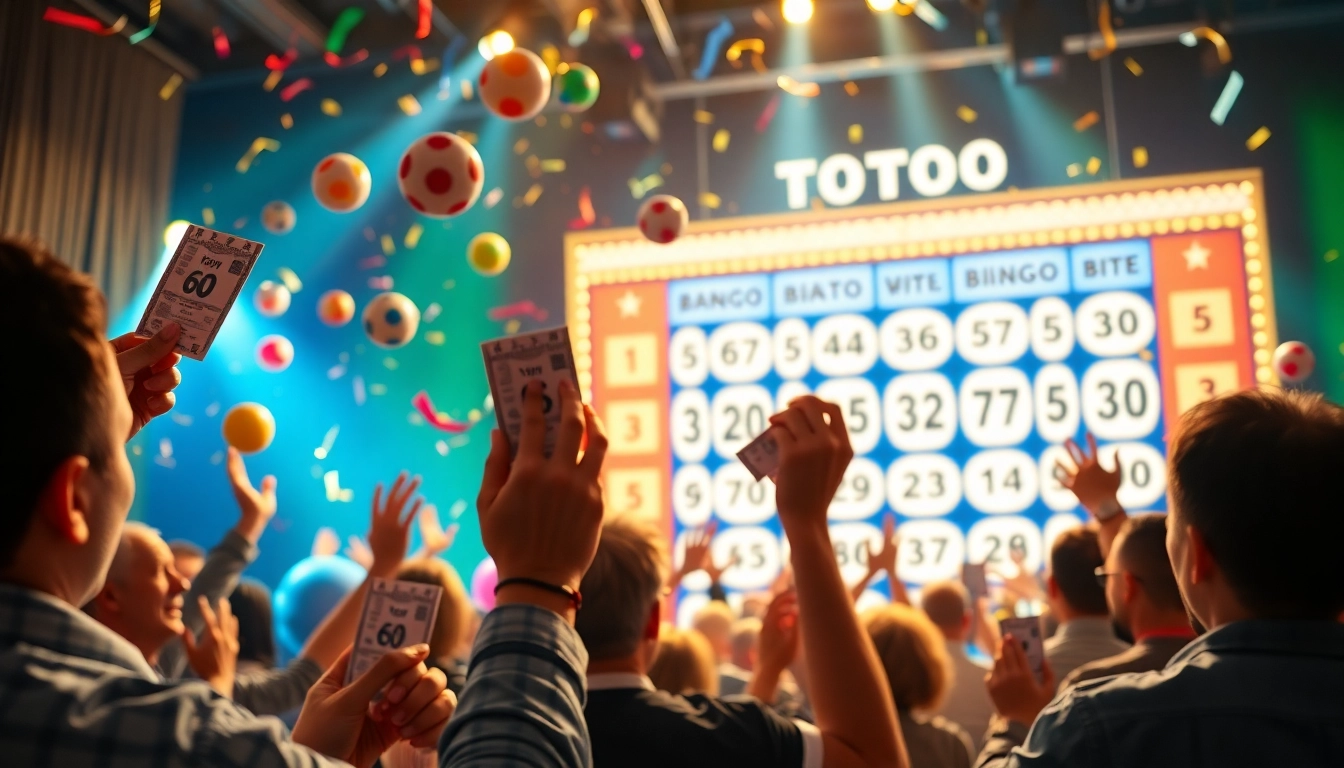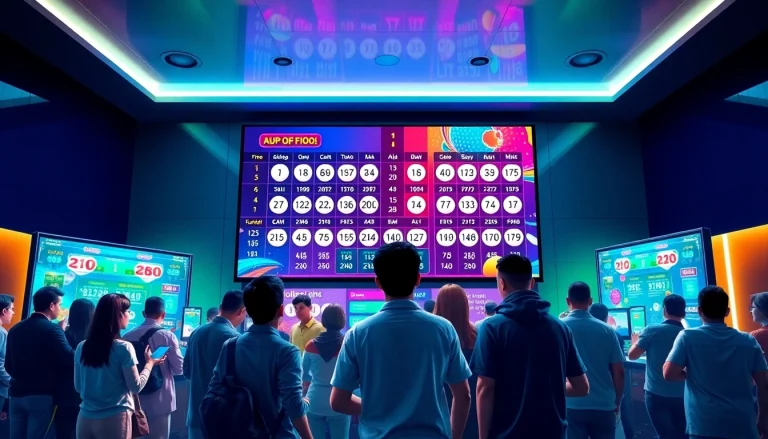Understanding the Basics of Lottery Games
What is a Lottery Game?
At its core, a lottery game is a type of gambling where players purchase tickets with numbers on them, hoping to win cash prizes through a random drawing. The allure of lottery games lies in their potential for substantial winnings with relatively low-cost entries. Typically operated by state governments or authorized entities, these games aim to provide participants with the thrill of chance and the potential for life-altering sums of money.
Over the years, lottery games have evolved, offering a plethora of formats and variations. From traditional number-drawing lotteries to instant win games and scratch-offs, the lottery landscape is diverse and continuously growing. The excitement associated with lottery games is not merely about the money; it often encompasses the thrill of anticipation as players wait for the draw results, hoping that their chosen numbers will lead to a big win.
Types of Lottery Games Available
Lottery games can generally be classified into three main categories: draw games, instant win games, and sports lotteries.
- Draw Games: These are traditional lottery games where players select a set of numbers in hopes of matching them with numbers drawn at random. Examples include Powerball and Mega Millions.
- Instant Win Games: Often referred to as scratch-off games, players purchase a ticket and reveal hidden numbers or symbols to determine if they have won. These games offer immediate results and quick payouts.
- Sports Lotteries: Some jurisdictions permit betting on the outcome of sporting events. These are quite different from conventional lottery games, as they require knowledge of sports and athletes rather than mere luck.
How Lottery Odds Work
Understanding lottery odds is critical for players who seek to maximize their chances of winning. Each game has its unique set of odds depending on the number of possible number combinations.
For instance, in a game like Powerball, you must choose five numbers from a set of 69 white balls and one number from a set of 26 red Powerballs. The odds of winning the jackpot with this combination are approximately 1 in 292 million. In contrast, games with fewer numbers will naturally have better odds, but lower potential payouts.
Players should always be aware of these odds when participating in lottery games. Knowing your chances can help set realistic expectations and prevent overspending in pursuit of a win.
Strategies to Increase Your Chance of Winning the Lottery
Choosing the Right Numbers
While lottery games are primarily based on chance, some players adopt strategies to select their numbers. Here are a few popular methods:
- Hot and Cold Numbers: Players often refer to “hot” numbers that have been drawn frequently and “cold” numbers that have seldom appeared. Some believe that playing hot numbers increases their chances.
- Using Random Number Generators: Utilizing technology, players can opt for random number generators that select numbers on their behalf, eliminating personal biases.
- Personal Significance: Many players choose significant dates, like birthdays or anniversaries, which limit the number choices. However, this method often leads to clustered number choices, potentially increasing the chance of shared jackpots.
Ultimately, the method you choose should reflect your comfort level with risk and personal beliefs surrounding luck.
Pooling Resources: Lottery Syndicates Explained
Lottery syndicates can significantly increase your chances of winning by pooling money with other players. In a syndicate, participants buy multiple tickets collectively, enhancing the overall odds of winning without a big increase in individual investment.
Players can organize syndicates with friends, family, or coworkers, and the winnings are typically shared according to the amount each person contributed. This method not only amplifies the chance of winning but also adds a social element to playing the lottery.
However, participants must have clear agreements regarding payouts and responsibilities to avoid potential disputes.
When to Purchase Tickets for Maximum Benefit
The timing of purchasing lottery tickets can impact your chances of winning. It’s advisable to buy tickets well in advance of the draw to ensure your numbers are entered, especially for popular games like Powerball or Mega Millions, where last-minute rushes can lead to sold-out tickets.
Also, participating in promotional draws or special events often yields bigger jackpots for the same ticket price, providing even greater value. Keeping an eye on promotional campaigns can offer opportunities to increase your returns.
Popular Lottery Games in the US
A Deep Dive into Powerball
Powerball is one of the most popular lottery games in the United States, known for its massive jackpots that can reach into the hundreds of millions of dollars. Players select five white balls from a drum of 69 and one red Powerball from a drum of 26. Drawings take place every Monday, Wednesday, and Saturday at 10:59 PM ET.
The game also has several prize tiers, meaning players can win smaller amounts by matching just a few numbers. The combination of high stakes and multiple ways to win has made Powerball a staple in American lottery culture.
Understanding Mega Millions
Mega Millions is another heavyweight in the lottery world, with similar mechanics to Powerball. Players choose five balls from a set of 70 and one Mega Ball from a set of 25. Drawings occur every Tuesday and Friday at 11:00 PM ET.
The game frequently offers substantial jackpots and features a second chance drawing, allowing players to enter non-winning tickets for another chance to win smaller prizes. Its popularity lies in the opportunity for life-changing money in conjunction with engaging game formats.
State-Specific Lottery Games and Their Features
Many states in the U.S. also offer unique lottery games that promote local engagement and fundraising. Each state lottery may have specific games tailored to its community preferences. For example:
- California Lottery: Known for its versatile offerings, such as the SuperLotto Plus, it contributes a significant portion of its earnings to education.
- Florida Lottery: Additionally popular for scratch-off tickets, it provides funds to enhance educational programs across the state.
- Arizona Lottery: This features numerous selections, promoting community funding and supporting local initiatives through lottery revenues.
These state-specific games reflect local tastes and contribute to the community, enhancing the lottery experience for players.
The Impact of Lottery on Community and Education
How Lottery Funds Are Used in Education
Lottery systems in many states allocate a significant portion of their revenues to education. This financial backing supports public schools, scholarships, and various educational programs aimed at improving student outcomes.
For example, the California Lottery dedicates approximately 34% of its total revenue to educational initiatives, helping to fund everything from school renovations to college scholarships. This enhances public trust in the lottery system and encourages participation, as players know their investments are contributing to a worthwhile cause.
Community Projects Funded by State Lotteries
In addition to education, lottery funds considerably affect community projects ranging from parks and recreational facilities to health and safety programs. States often allocate a percentage of lottery proceeds directly to local community initiatives, enhancing the quality of life for residents.
For instance, North Carolina funds have contributed to environmental conservation and the construction of public parks, while in Michigan, lottery revenue has been used for senior citizen programs and infrastructure projects.
This community engagement aspect not only boosts grassroots projects but also creates a sense of shared purpose among lottery players.
Balancing Lottery Fun and Responsible Gambling
While lotteries can be lucrative, it’s crucial to approach them with a sense of responsibility. The excitement and potential rewards must be balanced with awareness regarding the risks of gambling.
Many lottery organizations promote responsible gaming initiatives. This includes measures to prevent problem gambling, such as setting limits on the amount spent on tickets or encouraging breaks from play. Moreover, educational resources help players understand the odds and their risk levels.
Players should always gamble responsibly, ensuring that lottery participation remains a fun activity and not a financial burden.
Future Trends in the Lottery Industry
The Rise of Online Lottery Platforms
The growing trend of digitalization has significantly influenced the lottery industry. Online lottery platforms provide new opportunities for players to purchase tickets and participate in draws from the comfort of their homes.
These platforms not only broaden the reach of state lotteries but also attract younger demographics who prefer online experiences. The convenience, alongside innovative gameplay options, has led to increased participation and ticket sales.
Additionally, online platforms frequently introduce interactive features that enhance player engagement and offer higher odds of winning, further solidifying their position in the market.
Innovative Lottery Formats and Game Styles
The future of the lottery also lies in the creation of innovative game formats and styles. With the rise of gamification and interactive elements, players can expect a shift towards more engaging and immersive lottery experiences.
Some lotteries are exploring themed games linked to popular culture, allowing players to enjoy a more entertaining experience. Others are implementing features like live draws and virtual reality integrations to draw in more players.
This evolution is crucial for maintaining interest in lottery games and adapting to the changing preferences of players, ensuring the industry remains relevant and competitive.
Potential Changes in Regulations and Legislation
The regulatory landscape surrounding lotteries is continually evolving. Efforts to enhance transparency and fairness are likely to be at the forefront of future legislative changes. Government bodies may implement stricter regulations to prevent fraud and ensure that revenues are utilized effectively for public benefit.
Furthermore, as online lottery platforms gain ground, discussions may arise regarding how to legalize and regulate these offerings to protect consumers and ensure responsible gaming practices.
Staying informed on regulatory changes is essential for players and operators alike to navigate the lottery landscape effectively.



















